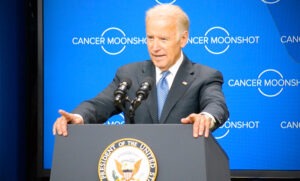The House of Representatives has approved a revised version of the 21st Century Cures Act, a comprehensive $6.3 billion health care reform measure that would fund the National Cancer Moonshot Initiative and amend FDA standards for regulating drugs and devices.
The House and Senate leadership postponed appropriations for fiscal 2017 in favor of a second continuing resolution that runs through March 31, 2017.
In an in-depth interview with The Cancer Letter, an FDA official clarified the agency's criteria for approval of drugs that target PD-1 and PD-L1.
Fred Hutchinson Cancer Research Center has opened a first-of-its-kind clinic focused on cellular-based immunotherapies for cancer patients in clinical trials.
President Barack Obama's legacy health care programs—the Affordable Care Act, and the National Cancer Moonshot Initiative—have been thrown into uncertainty.
Nearly 50 cancer-related organizations urged Congressional leaders to ensure that funds slated for research in the National Cancer Moonshot Initiative go directly to NCI—as opposed to NIH or any other federal entity.
MD Anderson Cancer Center lost $267.1 million on its operations in fiscal 2016. Now, a month into fiscal 2017, America's largest cancer center is on track to lose $400 million to $450 million.
HHS officials earlier this week announced that health insurance premiums under the Affordable Care Act plans will, on the average, increase by 25 percent next year.
Vice President Joe Biden and the National Cancer Moonshot Task Force published their final reports Oct. 17, summarizing the moonshot's achievements, and outlining five strategic goals and action plans for the years to come.
Nancy Davidson was named executive director of the Fred Hutchinson/University of Washington Cancer Consortium effective Dec. 1. For nearly eight years, Davidson has served as director of the University of Pittsburgh Cancer Institute.















